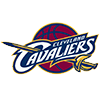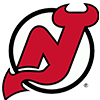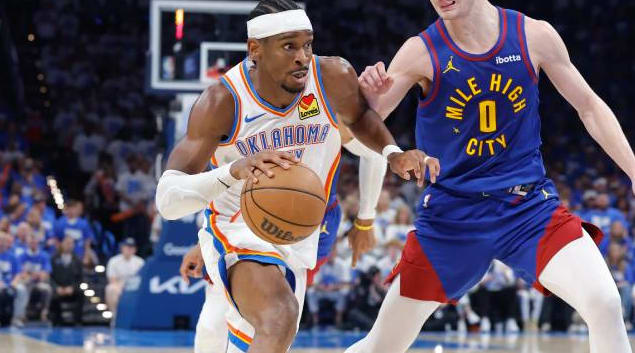The end is nigh. I don't mean that existentially (though I'm in no position to rule out that possibility), I'm talking about the end of the NBA season, now just two weeks away. Teams have between eight and 10 games remaining. Many head-to-head Fantasy leagues have their championships in Week 24.
The waiver wire is deep this week. The fourth player this week would have been No. 1 most weeks. With so many good options available, one point is important to underscore: pick the player that best fits your roster's needs, which is not necessarily the player with the best overall stat profile.
One last point before we get to the players – I went deep, arguably too deep, trying to provide schedule analysis to help managers get the most out of the remaining schedule. The Schedule Notes section at the bottom is beefed up this week, so take a look to make sure you're getting the most out of the schedule and your league's settings.
As usual, the players in this article must be rostered in less than two-thirds of CBS leagues. Players are listed in the order that I recommend adding them, assuming they are equally good fits for your team.
Adds for all leagues
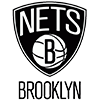 Bruce Brown, Nets (60% rostered)
Bruce Brown, Nets (60% rostered)
It looks like Kyrie Irving will be playing every game down the stretch after New York City created a carve-out exempting famous people from its vaccine mandate. Brown's numbers aren't much different with or without Irving lately
The end is nigh. I don't mean that existentially (though I'm in no position to rule out that possibility), I'm talking about the end of the NBA season, now just two weeks away. Teams have between eight and 10 games remaining. Many head-to-head Fantasy leagues have their championships in Week 24.
The waiver wire is deep this week. The fourth player this week would have been No. 1 most weeks. With so many good options available, one point is important to underscore: pick the player that best fits your roster's needs, which is not necessarily the player with the best overall stat profile.
One last point before we get to the players – I went deep, arguably too deep, trying to provide schedule analysis to help managers get the most out of the remaining schedule. The Schedule Notes section at the bottom is beefed up this week, so take a look to make sure you're getting the most out of the schedule and your league's settings.
As usual, the players in this article must be rostered in less than two-thirds of CBS leagues. Players are listed in the order that I recommend adding them, assuming they are equally good fits for your team.
Adds for all leagues
 Bruce Brown, Nets (60% rostered)
Bruce Brown, Nets (60% rostered)
It looks like Kyrie Irving will be playing every game down the stretch after New York City created a carve-out exempting famous people from its vaccine mandate. Brown's numbers aren't much different with or without Irving lately – there's a slight drop-off when Irving plays, but it's small and mostly impacts his assists. Brown is inside Fantasy's top-45 in 9-cat (top-65 in 8-cat) since entering the starting lineup after the trade deadline. Irving has played in almost half of those games. Brown is an all-leagues must-add.
 Tyus Jones, Grizzlies (16% rostered)
Tyus Jones, Grizzlies (16% rostered)
Ja Morant (knee) is out for two weeks, meaning all but the last two games of the regular season, at best. Jones is now the starting point guard for most, if not all, of the remainder of the season. He is averaging 6.8 assists in starts and 9.3 over his last three games without Morant. He's an inconsistent scorer and rebounder, though he is capable of helping in both categories. But his non-assist stats are besides the point. Assists are one of the hardest stats to find on waivers, and Jones is likely to rank somewhere between fifth and 15th per game in assists through the final two weeks of the season.
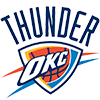 Tre Mann, Thunder (45% rostered)
Tre Mann, Thunder (45% rostered)
Tanking tends to create waiver wire prospects, and Mann is the latest Thunder player to benefit. He's averaged 24-6-2 over the last four games, incredible numbers for a waiver pickup. Oklahoma City is currently pretending that Josh Giddey (hip) might return soon, but I strongly doubt it. Shai Gilgeous-Alexander (ankle) has missed two of the last three games, and he's overdue to get shut down, too. Mann is probably here to stay.
 De'Anthony Melton, Grizzlies (36% rostered)
De'Anthony Melton, Grizzlies (36% rostered)
Melton is also a big beneficiary of the Morant injury. He's averaging 19-5-2 with 4.7 threes and 1.3 steals over Morant's last three absences. He's a bit of a drain in the shooting percentages, but the prospect of two weeks with the rest of those production levels should more than make up for it.
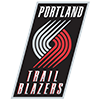 Drew Eubanks, Trail Blazers (40% rostered)
Drew Eubanks, Trail Blazers (40% rostered)
Another repeat name from the last few weeks. Eubanks is averaging 16-9-3 over the last seven games. He's still not blocking many shots, but he was a big-time shot blocker in college and averages 1.8 per-36 for his NBA career – I maintain that more blocks are likely coming. As I said last week, he's a souped-up version of the classic Fantasy waiver wire big – decent points, good rebounds, some blocks, great FG%, except Eubanks also adds some assists and respectable FT%.
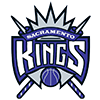 Davion Mitchell, Kings (49% rostered)
Davion Mitchell, Kings (49% rostered)
De'Aaron Fox (hand) has missed the last three games. The Kings haven't given us much information on the injury, but given their position in the standings – functionally (though not mathematically) eliminated from the play-in tournament but in a crowded race for the fifth-worst record – makes me wonder if Fox is done for the season. Mitchell has been excellent stepping in as the starting point guard, averaging 22-2-6 across three games without Fox. If Fox comes back, Mitchell probably becomes droppable. On the other hand, if we knew for a fact that Fox was done for the season, Mitchell would be this week's top pickup.
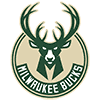 Brook Lopez, Bucks (26% rostered)
Brook Lopez, Bucks (26% rostered)
He's starting again and the minutes restriction is gone. He's a mediocre scorer and rebounder, but he's as good a shot-blocker as you'll ever find on waivers, and he contributes a few threes, too. If you need blocks, Lopez is the best pickup available. If you don't need blocks, then you don't need Lopez, either.
 Bones Hyland, Nuggets (35% rostered)
Bones Hyland, Nuggets (35% rostered)
The good: Hyland is averaging 16-4-4 with 3.0 threes per game over his past seven games. The bad: Though his production has been weirdly consistent throughout this run, his workload has been all over the place: two games with less than 20 minutes and two with more than 30. He's also on an unsustainably hot shooting streak, averaging 52% from the field and 50% from three during this stretch (he was shooting 37% and 36% over his first 53 games).
His recent numbers are absolutely rosterable, but I don't trust any of this. I love Hyland as a one-game streamer any time from now until the wheels fall off. But if you're looking for someone you can count on for multiple games, there are a lot of options I trust more, even if their upside may not be as high.
 Immanuel Quickley, Knicks (51% rostered)
Immanuel Quickley, Knicks (51% rostered)
Speaking of things I don't trust: Tom Thibodeau's rotations. Quickley is averaging 15-5-5 over his last five games, and he's developed into a pretty solid Fantasy weapon. But Quickley isn't 37 years old and he didn't play for the 2010 Bulls, so there's always the risk that Thibs arbitrarily decides to start yanking Quickley's minutes again. It's been a full month since Quickley last played under 20 minutes in a game, Kemba Walker's season is over, and Derrick Rose appears to be nowhere close to returning, so hopefully there will be no more Thibs' chicanery. Quickley is currently one of the best sources of assists available on waivers, so if you trust Thibodeau more than I do, he's a valuable pickup.
 Goga Bitadze, Pacers (21% rostered)
Goga Bitadze, Pacers (21% rostered)
The Pacers' frontcourt is dealing with a bunch of injuries right now. There have been no recent updates on Myles Turner's (foot) timeline. Jalen Smith (illness) has missed two games with an illness, and Isaiah Jackson (head) has missed three of the last four games and managed only seven minutes in the fourth game. Every big man who returns to action meaningfully decreases my interest in Bitadze, but he's worth rostering while at least two of those three are out. He's averaged 18-7-3 with 1.3 threes over the last three games.
 Trey Lyles (18% rostered) and Damian Jones (2% rostered)
Trey Lyles (18% rostered) and Damian Jones (2% rostered)
As with Fox, the Kings are posturing as though Domantas Sabonis (knee) might return this season, but that's highly unlikely. Sabonis has already been ruled out for the next four games. They only have four games left after that, at which point they will be mathematically eliminated from the postseason. Lyles has been starting all month, and he's averaged 12-5-1 across Sabonis' last three missed games. He should be a solid, albeit unspectacular producer throughout the remainder of the season. Jones is also a big beneficiary of the Sabonis injury. He'll likely score and assist less than Lyles, but he's a better source of rebounds, steals, and blocks.
Other recommendations: Jaxson Hayes, Pelicans (42% rostered); Corey Kispert, Wizards (20% rostered); Herbert Jones, Pelicans (59% rostered); Matisse Thybulle, 76ers (21% rostered); Pat Connaughton, Bucks (21% rostered); Brandon Williams, Trail Blazers (39% rostered)
Schedule Notes
Every league has different rules, and your league's settings should determine which elements of the schedule are most important to you. The biggest questions right now are:
- Does your season end after Week 24 or with the last day of the NBA season (Sunday, April 10)?
- Do you set lineups weekly or daily?
- How many acquisitions are you allowed? (Most leagues have a weekly maximum, though some have a season-long max, and others have no max at all; this only really matters in daily lineups leagues)
The analysis below is split into sub-sections to help managers focus on advice for their own leagues' formats.
Also, I cannot recommend this tool highly enough – the RotoWire Weekly Schedule Grid. It's a great tool for looking at a whole week's schedule and identifying the teams who can help you the most.
Depending on how your league operates and handles the end of the season, here's how to attack the remaining schedule:
Weekly lineups, season ends after Week 24:
The most important schedule nuance is that the Cavaliers have a five-game week in Week 25. That gives all Cavs a massive Fantasy advantage.
The next big thing is that Week 24 is unusually busy – there are no two-game weeks, and only seven teams play three games (Nets, Hornets, Grizzlies, Timberwolves, Pelicans, Suns, Jazz). That means that playing just three games is a meaningful disadvantage. Where possible, players on those teams should be avoided.
Finally, not all four-game weeks are created equal. Championships are on the line, so every small advantage counts. We want to prioritize teams that play Monday, play most of their games at home, and avoid back-to-backs. Playing Monday means that we have the maximum amount of knowledge and flexibility before making the decision to start or bench a player, while home games and added rest improve players' performance (albeit their impact can be small).
Among teams with four-game weeks, the Rockets have the best schedule – four home games, a day of rest between each game, and two games against the Kings. They are followed by the Celtics, Pacers, Thunder, Spurs, and Raptors, each of whom has three home games and no back-to-backs.
Next up are the Magic and Trail Blazers, who are split evenly with two home games and two road games, followed by the Nuggets and Kings, who play three road games and only one home game. Every team mentioned in this paragraph plays Monday, Wednesday, Friday, and Sunday.
Weekly lineups, season ends April 10:
If your season lasts through the end of the season, then in addition to all the information in the sub-section above, you'll also want to keep an eye on the Week 25 schedule. The most important thing to prioritize is short-term production (i.e. Week 24), but if you are on the fence between two players, a good Week 25 schedule is a logical tiebreaker.
Week 25 evenly split between three-game weeks (14 teams) and four-game weeks (16 teams). With a more even split, three-game weeks will not be as harmful as they were in Week 24, but four-game weeks are still better.
The following teams have four-game weeks in both Week 24 and Week 25: Hawks, Lakers, Bucks, Thunder, 76ers, Trail Blazers, Spurs, Raptors, and Wizards.
There are no games Monday, April 4, so every team with four games in Week 25 plays at least one back-to-back. Among the teams with a four-game, back-to-back-free Week 24 mentioned above, the Thunder, Trail Blazers, Spurs, and Raptors are the only ones to follow that up with another four-game week in Week 25.
Daily lineups, season ends Week 24:
Week 24 is busy and the day-to-day schedule is very imbalanced. There are only five games on Tuesday, Thursday, and Saturday. But Monday has nine games, Wednesday has 11, Friday has 10, and Sunday has 12. That means that most managers are going to have tons of room in their starting lineups on the light days, and they may have no room for waiver pickups on the busy days.
The first thing managers must do is check their lineups on the four busy days. Most managers will have an empty spot or two on Monday and Friday, while their lineups will already be full on Wednesday and Sunday. But that won't be true for everyone.
Any potential waiver pickup who plays on a day when your lineup is already full has, as far as you're concerned, one fewer game in Week 24. That means that if you are one of the many managers with an already-saturated Wednesday and Sunday, then the Timberwolves, Pelicans, and Suns effectively only play once (since they all have a three-game, Wed-Fri-Sun schedule). Potential waiver pickups from those teams are basically useless to you.
The best course of action is to figure out which days you're already stacked, and then consult the schedule grid linked above to identify which teams work best for you. That said, the following should apply to all daily lineups managers:
- The Bulls have the best schedule, playing Monday and on all three light days
- The 76ers are next, with games on all three light days and Sunday.
- Then come the Cavaliers, with a five-game week including two light days (Thursday & Saturday)
- After those three teams, there is a group of teams with similarly attractive schedules. The Nets and Jazz only play three games, but all of them are on light days. The Pistons, Hawks, Lakers, Clippers, and Bucks all have four-game weeks including two on light days.
- The next group is the Mavericks, Warriors, Heat, Knicks, and Wizards, who all have four-game weeks including one game on a light day. All of these teams also play Sunday, however, when almost every Fantasy lineup will be filled.
Daily lineups, season ends April 10:
If your season lasts through the end of the season, then in addition to all the information in the sub-section above, you'll also want to keep an eye on the Week 25 schedule. The most important thing to prioritize is short-term production (i.e. Week 24), but if you are on the fence between two players, a good Week 25 schedule is a logical tiebreaker.
The three teams mentioned above with the best Week 24 schedules for daily managers were the Bulls, 76ers, and Cavaliers. The Bulls and 76ers both have four games in Week 25, while the Cavs only play three. Advantage Bulls and 76ers.
The best Week 25 schedules probably belong to the Grizzlies, Pelicans, Spurs, and the aforementioned 76ers. Those teams have four-game weeks including one on Saturday's light four-game slate.
The other way for a team to have an above-average Week 25 schedule is to play two games on Wednesday, Thursday, or Saturday, thereby avoiding the busy 12-game Tuesday and nine-game Friday slates. The Celtics, Warriors, and Clippers meet that criteria with their three-game weeks.
Daily lineups, strict acquisition limits:
Managers in this format want to maximize adding players with back-to-backs and three-games-in-four-nights (3-in-4s). Much of the advice in the daily lineups, season ends Week 24 section applies here, so read that section first, but I'll add some new tips below.
The imbalanced Week 24 schedule throws a wrench in here, however, as managers should be careful to incorporate their existing lineups into this analysis. What that means is, if your lineup is already full on Wednesday's 11-game slate, then adding someone with a Tuesday-Wednesday back-to-back (Mavericks or Wizards) is no better than a player who plays Tuesday and is off Wednesday. In this situation, managers should actually target players who play Tuesday and Thursday – which happens to mean anyone other than a Mav or a Wizard, as every other team who plays Tuesday is off Wednesday and active Thursday.
In this league format, the Bulls are arguably the team with the best schedule, playing a 3-in-4 that starts Monday and includes games on the light Tuesday and Thursday slates, with the bonus of their final game coming on Saturday's light slate.
If it's not the Bulls with the best schedule, then it's the Cavaliers. They have five games, ending the week with a rare 4-in-5 that includes games on two light slates (Thursday & Saturday).
If you're looking to make a pickup on Tuesday, the best targets are the Pistons, Lakers, Bucks, and Clippers, who all have a Tue-Thurs-Fri 3-in-4.
Managers targeting a Thursday pickup need to look at their own rosters first. Are your lineups already full on Friday, Sunday, both, or neither?
- If your lineup is already full on Friday but not Sunday, then target the Cavaliers and 76ers, who end the week on a 3-in-4 that skips Friday;
- If your lineup is already full on Sunday but not Friday, then add anyone with a Thursday game – everyone who plays Thursday has exactly one more game on either Friday or Saturday; that said, there may be strategic advantage in adding the players who play Saturday, blocking them from your opponents (teams listed in next bullet);
- If your lineup is already full both days, then target Cavaliers, 76ers, Hawks, Bulls, Jazz, and Nets, who play Thursday and Saturday;
- If your lineup is not full on either Friday or Sunday, then your top priority should be locking in a player who closes the week with a 3-in-4: the Cavaliers, 76ers, Bucks, Clippers, Lakers, and Pistons. If looking for an additional tiebreaker, there may be some added strategic benefit to picking up a Cavalier or a 76er, as those two play on Saturday's small slate and therefore may have added appeal to an opponent.

















